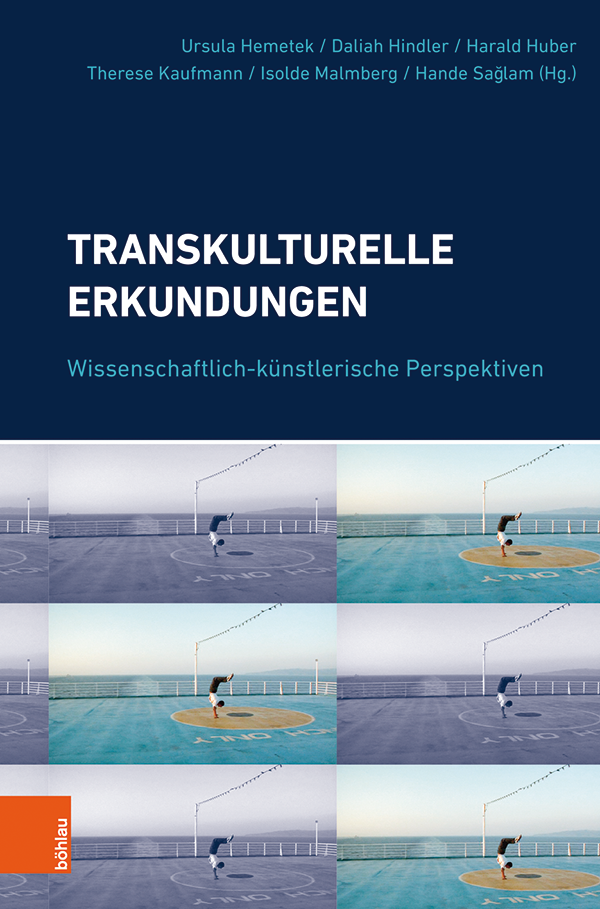Ursula Hemetek, Daliah Hindler, Harald Huber, Therese Kaufmann, Isolde Malmberg, Hande Saglam (eds.): Transkulturelle Erkundungen. Wissenschaftlich-künstlerische Perspektiven. Böhlau Verlag (Vienna), 1st Edition, 2019.

With a mixture of theoretical conceptualisation, practice-based experiences, and questioning of current cultural policies, the contributors to Transkulturelle Erkundungen. Wissenschaftlich-künstlerische Perspektiven [Transcultural Explorations. Scholarly and Artistic Perspectives] mapped out a path towards how the future of music education might look and the changes universities would have to undergo in order to provide transcultural spaces of learning. This book, published in 2019 by Böhlau Verlag (Vienna Cologne Weimar), marks the culmination of a lecture series at the mdw that explored the notion of transculturality from an interdisciplinary perspective, and it includes a selection of individual presentations given between 2014 and 2018. The format of the mdw lecture series Transkulturalität examined the multiplicity of notions of transculturality and music by pairing a wide range of interdisciplinary academic contributions with theoretically related artistic performances. This book was published with support from the mdw and is available in a hardcover printed edition or as a free download as part of the mdw’s open-access policy.
This volume elaborates on the concept of transculturality based on the ideas of Fernando Ortíz (1940) and Wolfgang Welsch (1992, 1995, 1999), among others. It is a theoretical exploration of the implications of transculturality for practices of learning, performing, and music-making. One of its central ideas is that higher education should become a transcultural space of learning instead of limiting itself to the pursuit and reproduction of monocultural epistemologies. This notion is explored in the chapter by Brazilian scholar José Jorge de Carvalho, in which he explains the process by which the University of Brasilia, embracing notions of in-betweenness and transculturality through the “Meeting of Knowledges”, has incorporated traditional learning, wisdom, and skills into its curriculum. The title Notório Saber (lit.: “Notorious Knowledge”) is awarded by universities in Brazil to acknowledged masters and socially recognised people who have “exceptional knowledge in any area of academic studies (2019:89).” In this way, the “Meeting of Knowledges” includes Afro-Brazilian and indigenous teachers who would have otherwise been excluded from formal education programmes. Ursula Hemetek’s contribution complements this “Meeting of Knowledges” approach by proposing the adoption of a “Meeting of Musics” as a means of voicing cultural alterity and providing agency to minorities through music education. For Hemetek, the importance of transculturality lies in the commitment to educational policies that provide space for coexistence and dialogue in the interest of cultural diversity and hybrid identities as an integral part of political education strategies (2019:108–109).
Transkulturelle Erkundungen not only explores the positioning of the editors and authors regarding the concept of transculturality but also addresses the need to incorporate transcultural strategies and practices in order to facilitate more inclusive environments and interdisciplinary frameworks. Moreover, it is a plaidoyer for the safeguarding of cultural diversity, minorities, and hybridity in the midst of current global and local political developments. To this graduate student, reviewing the work of such outstanding scholars at first felt somewhat daunting. But it soon became clear that this book is about the future of students with diverse cultural backgrounds and identities, and about how the strategy of transculturality and its institutionalisation do represent—and indeed should serve as—the backbone of music education for generations to come.
- Upcoming lectures Transculturality: www.mdw.ac.at/ive/transkulturalitaet
- Lecture series Transculturality_mdw symposium: Decolonising of Knowledges, on 3 and 4 May 2019: www.mdw.ac.at/ive/transkulturalitaet
